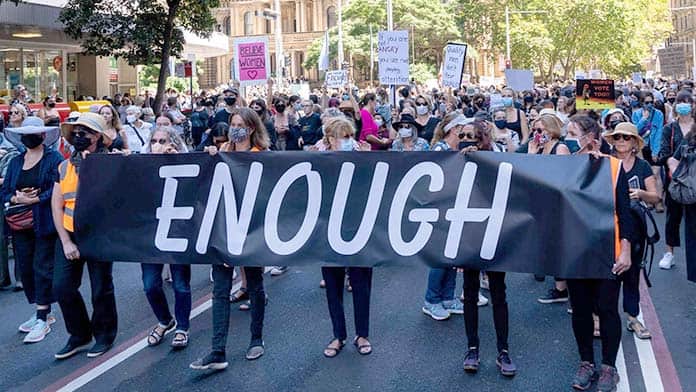Former Judge Walter Sofronoff’s report on his Inquiry into the R v Lehrmann trial, or the Brittany Higgins rape trial is an undisguised attempt to wind the clock back on the Australian #MeToo moment, and a white wash of the entrenched sexism in the ACT police.
In 2021, Brittany Higgins publicly alleged that she was raped in parliament house and that Liberal Party politicians including then PM Scott Morrison covered it up. She helped spark a government-toppling rage against the sexism in the heart of Australian politics.
But, as so many women have experienced, the ensuing police investigation and rape trial was a travesty. The trial was aborted due to juror misconduct, but from the moment she went to the police Higgins met the same hostility and pressure to be silent that her Liberal Party bosses applied.
ACT Director of Public Prosecutions Shane Drumgold accused the police of campaigning to avoid the trial, of bullying Higgins, and of more generally failing victims of sexual assault. The ACT Attorney General commissioned Walter Sofronoff KC to head an inquiry into these allegations, and the subsequent police counter claims against Drumgold.
Despite Sofronoff’s attempt to crucify Drumgold, the inquiry starkly reveals that the ACT police force is soaked in sexist prejudice against rape victims.
By their own admission, the ACT police investigators did not want to put Lehrmann before the court because of concerns about maintaining his “presumption of innocence”, a radical reversal of their priorities in cases other than sexual assault.
The inquiry reports that leading police investigator Detective Superintendent Moller became “immediately suspicious” of Ms Higgins’ “motives for reporting the incident” because Higgins had gone to the media. Moller subsequently agreed to charge Lehrmann but only after Drumgold insisted that there was enough evidence for the case to go to trial.
It is very clear that without the public protests, it would have been business as usual for the ACT police and Lehrmann would never have been charged.
But rather than investigating how police views drove their attempt to sabotage the case, Sofronoff astoundingly found the police to be “competent and professional”.
Yet we know the police leaked counselling and interview notes to Lehrmann’s lawyers, mishandled crucial CCTV footage, compiled dossiers of distorted and biased evidence to try to convince Drumgold not to proceed to trial, subjected Higgins to unnecessary interviews and hectoring lectures to dissuade her from her advocacy, most likely leaked confidential information to the press, and did not know the basic threshold for making a charge of sexual assault.
His praise is impossible to stomach: “the investigators and their immediate superior officers performed their duties in absolute good faith, with great determination although faced with obstacles and put together a sound case.”
No justice in the courts
Given the very broad terms of reference, Sofronoff could have inquired why, in the ACT, only about 3 per cent of sexual assault matters brought to police result in prosecution, and around Australia almost 90 per cent of sexual assault victims do not go to the police.
Instead, Sofronoff chose to eviscerate the whistleblower, Shane Drumgold, accusing him of unethical misconduct.
Unconvincingly, Sofronoff lists among the outrages the fact that Drumgold asked loaded questions of Liberal Senator Linda Reynolds in court and that Drumgold undermined Lehrmann’s presumption of innocence when he made a statement that he remained convinced there were reasonable grounds for conviction but that Higgins’ health required the trial’s abandonment.
Of utmost irony are Sofronoff’s complaints about Drumgold’s failure to adequately dissuade media from discussing the trial.
Sofronoff himself selectively briefed journalists during the inquiry, and then leaked his own report to Janet Albrechtsen from The Australian before it had been provided it to the Chief Minister as required by law. Albrechtsen has used the columns of The Australian numerous times to accuse Higgins and her partner of “us(ing) the media, instead of the criminal justice system, to press their case”.
Sofronoff has demonstrated, once again, why most women will not look for, and will not find, justice from the police and courts. It could not be clearer that from parliament, to the courts, to the police, and the media, the most powerful institutions in this country will preserve oppressive sexist double standards that degrade women.
The tens of thousands of women who took to the streets in the women’s march for justice in 2021 have an expectation that things must change. But to win respect and freedom from sexist humiliation we will have to build a deep protest movement to take on the institutions and confront the sexist system they maintain.
By Lucy Honan






